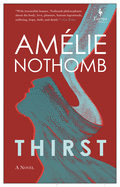
Prolific writer Amélie Nothomb (Tokyo Fiancée; Pétronille), who's published a book annually since her 1992 debut, chooses Jesus as her 2019 protagonist in Thirst, her sixth title translated by Alison Anderson. At just 96 pages, Thirst is an easy single-sitting book, but its sly irreverence encourages repeat readings.
Nothomb sticks vaguely to the known script: Pontius Pilate sentences Jesus, he bears his cross, he's crucified with two thieves, he dies, he rises. But here, Nothomb grants Jesus first-person intimacy as "the most incarnate of human beings." Diverging dramatically from the recognizable, Jesus reveals his deepest thoughts with humor, fear, misgiving, but mostly aching honesty. He also proves himself a Proust fan.
During his imprisoned final night--even as the Gospels insist "this night I am writing from does not exist"--Jesus asserts new truths: he misses Joseph; Mary is a "far better person" than he; he loves Mary Magdalene (he called her Madeleine because he didn't like double names and "it's never a good idea to confuse your sweetheart with your mother"). He dares to dream of a future in which he lives, and he refuses water so he might arm himself with thirst as preparation for the tortures ahead, because thirst "can become so great that all other suffering will be deadened."
Nothomb, a baroness who has rewritten her own provenance story (she alleges Japanese birth despite Belgian records), seems rather practiced in embellishing history. With Thirst, she entices lucky readers with a dissenting, potentially heretical, refreshingly fascinating interpretation of an all-too-familiar life. --Terry Hong, Smithsonian BookDragon

